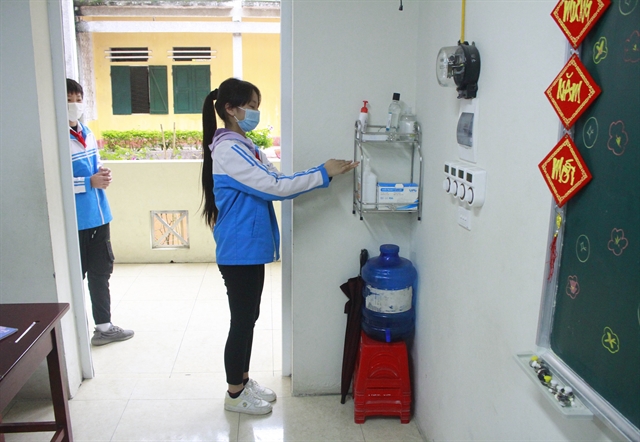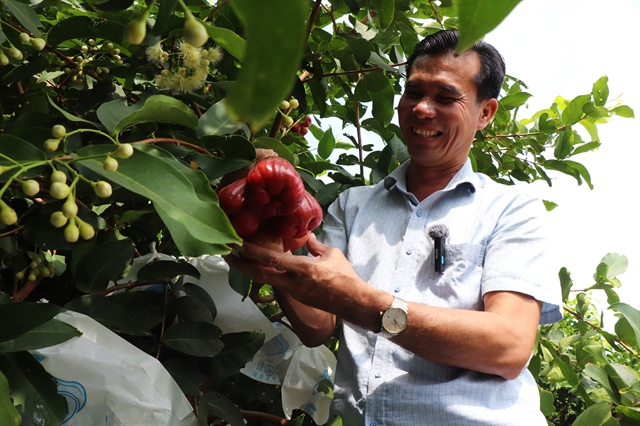 Opinion
Opinion


|
| A student at a school in northern Ninh Bình Province disinfects her hands before entering class. — VNA/VNS Photo |
Minister of Education and Training Nguyễn Kim Sơn talks to Pháp luật Tp. HCM (HCM City Law) online newspaper about the key tasks for the sector in 2022 and measures to ensure safety for students in schools.
Those working in the education and training sector as well as pupils, their parents and society must be delighted at the decision to reopen schools in recent days?
That is the desire of society. However, the decision to reopen schools must be put in the context of the whole system, which must ensure safety and health for everyone, particularly children, pupils and students.
Implementing the Prime Minister’s direction at the Government meeting about preparations for conditions to reopen schools is based on the Ministry of Health’s assessment on pandemic prevention and control results and the need to ensure physical and spiritual health of children, pupils, students and teachers and education quality.
The Ministry of Education and Training proposed the People’s Committees of provinces and cities to guide the plans and roadmaps to organise in-person learning for students before February 14, based on the pandemic progress in each locality.
Is the reopening of schools expected to help deal with the unexpected impact on students?
Yes, it is. We have had enough grounds, experience and conditions to determine the reopening of schools.
I felt very excited to see students back to school over the past few days. The reopening of schools is not only a good sign for the education and training sector but also helps to convey messages about the recovery of society and the country.
This is not only the reopening of schools but also the strengthening and restructuring of the education sector after the pandemic.
The reopening of schools will bring joyfulness to society but there are still fears. What do you think?
It must be understood that some people still worry due to a long time of online learning and the risk of spreading the pandemic.
However, I want to confirm that the Ministry of Education and Training has had many measures to prevent risks and ensure the most safety for students when they return.
The preparations of education facilities and plans and scenarios to handle any circumstances following the guidance of the health sector play a very important role.
There is also the need to have effective coordination between schools and families in supervising student health to prevent risks.
On February 8, the ministry sent a dispatch requiring directors of 136 departments of education and training to pay attention to seven key issues to ensure safety for students at schools.
We will closely follow and flexibly handle any emerging circumstances.
Is it necessary for students to catch up after a long time of studying online?
It is not only urgent but also a long-term issue. The ministry directed localities to have plans to make up for knowledge for students when they return to schools for in-person learning, including reviewing, assessing and classifying students into different groups to have proper teaching plans.
Schools will also need to recognise the psychological issues of students to provide timely consultancy and support for them after returning.
In 2022, which key tasks will the education and training sector focus on while handling the impact of the pandemic?
There are many key tasks following the direction of the Party, National Assembly and Government as well as from the requirements of reality and people’s wishes.
In the short term, we will implement the 2018 general education curriculum for grades 3,7 and 10; improve the quality of compiling, assessing and choosing textbooks for grades 4,8 and 11; and prepare conditions for the new curriculum such as with teaching staff, restructuring and teaching equipment.
We will focus on organising the high school graduation exam and university and college admissions in 2022 in line with pandemic conditions and the need to renew high school education and higher education.
The ministry will carry out the strategy on education development during 2021-2030 with a vision towards 2045; continue the tertiary education development framework, and plan for the network of tertiary education establishments and education colleges during 2021-2030.
The sector will also continue with university autonomy; developing science and technology; speeding up innovation; digital transformation, administrative reform and application of information and technology in education and training.
How will regulations and institutional reform be implemented in the education sector?
The Ministry of Education and Training will increase inspection and examination of education-related policies and regulations to build a healthy education environment and strictly punish violators.
The ministry will pay attention to law building and institutional reform following direction from the Government and the Prime Minister. The ministry will continue institutionalising Party and State viewpoints and policies about education and training development; reviewing and completing legal documents; studying to build the Law on Teachers and Law on lifelong learning; and propose amendments to the Law on Tertiary Education.
Most importantly, the education sector will pay attention to ensuring equality in access to education for all and meeting the education demands of vulnerable groups. VNS




